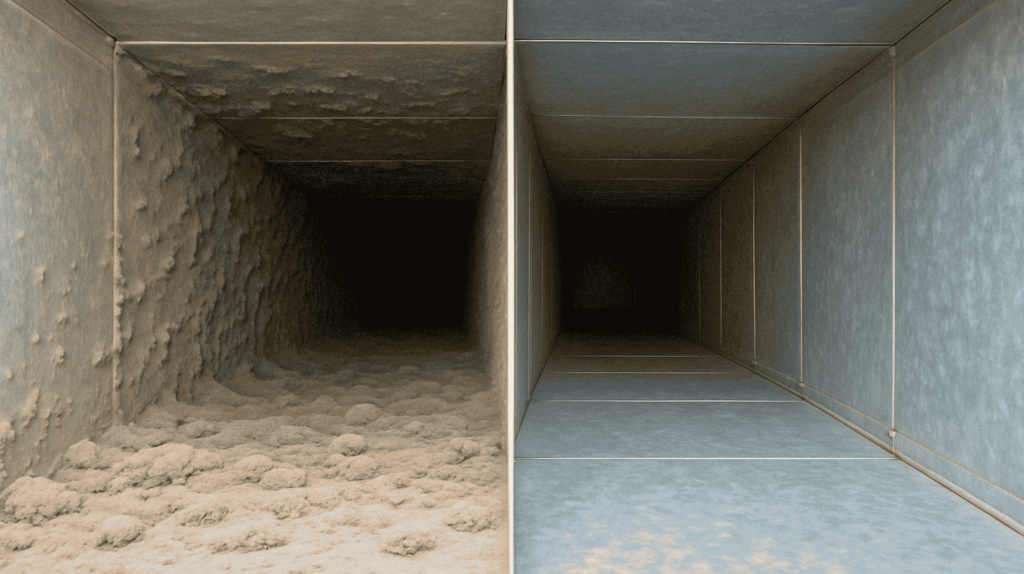Have you found yourself wondering why your air conditioner smells bad lately? It is common for your unit to have a slight odor when switching between heating and cooling seasons. A persistent, musty smell, however, could indicate a problem with your air conditioner. This unpleasant odor is actually called “dirty sock syndrome” in the HVAC industry and can be caused by several factors. But don’t fret; there are steps you can take to keep your home from smelling like a high school football team’s locker room.
What Causes Dirty Sock Syndrome?
Dirty sock syndrome is caused by mold and mildew buildup in your air conditioner, especially on the evaporator coil. The moisture that collects in your unit from continued use, accumulated dust and debris, and inadequate filtration are the trifecta that encourages microbial growth and causes the air in your home to smell foul. The easiest thing you can do as a homeowner is change the air filter regularly to keep your home smelling fresh. Sometimes, though, the air filter is not the sole cause of the odor in your home.
Reasons Why Your Air Conditioner Smells Bad
In most cases, the reason why your air conditioner smells bad is because there is excessive moisture allowing bacteria, mold, and mildew to grow and get circulated throughout your home. But what causes this excess moisture? What other AC issues can cause your unit to stink? Below are the most common reasons your home may experience dirty sock syndrome.
Improperly sized unit
It’s possible your air conditioner could smell bad because it is actually too large for your home. Remember that your air conditioner serves two purposes when the weather is hot—it cools and dehumidifies your home . Warm air holds more moisture than cool air, so when the air conditioner moves heated air out of your home and replaces it with cooler air, some moisture is eliminated too. An air conditioner that is too large for a home will perform a cooling cycle quickly, not running long enough to sufficiently remove moisture from the air. On the hot summer days in Des Moines when humidity builds up, mold and mildew can develop and distribute the unpleasant smell throughout the whole house.
Faulty filtration system
Contaminants are removed from the air in your home by an air filtration system. Whole-house air purifiers and UV air purifiers are particularly effective when it comes to removing pollutants from the air. Ultraviolet air purifiers are becoming more and more popular to install in the ductwork because of their ability to decompose bacteria, mold, animal dander, dust mites, and chemicals before they circulate through your home. Regardless of the air filtration system your air conditioner uses, if it is faulty it will not effectively remove contaminants from your home’s air, causing it to smell bad.
Dirty coils
The coils in your air conditioner will collect dust and dirt over time, but dusty coils alone shouldn’t cause your air conditioner to smell bad. If mold and bacteria have grown on the coils, you’ll likely notice an odor because the air blows directly over the coils as it enters your home. If you choose to clean the coils yourself, please remember to turn off the AC, the thermostat, and HVAC circuit breaker on your main power panel. Otherwise, call a professional to ensure the coils are properly cleaned while maintaining the safety and function of the unit.
Clogged drain
Before calling an HVAC contractor to investigate a smelly air conditioner, check the condensate drain. If it is clogged, clear away any blockages and empty the drain pans. Water that builds up in the pans creates the perfect dark, moist environment mold and mildew need to thrive. The microbial growth will cause a musty odor to waft through the ductwork and into your home if not cleaned adequately. Remember that some moisture in your air conditioner is normal, but excessive moisture will cause problems.
Are you tired of the bad smell coming from your air conditioner? Call the professionals at Lenz Heating and Cooling. Our technicians will identify the source of the foul odor and help resolve the problem so you can enjoy safe, clean air this summer!





